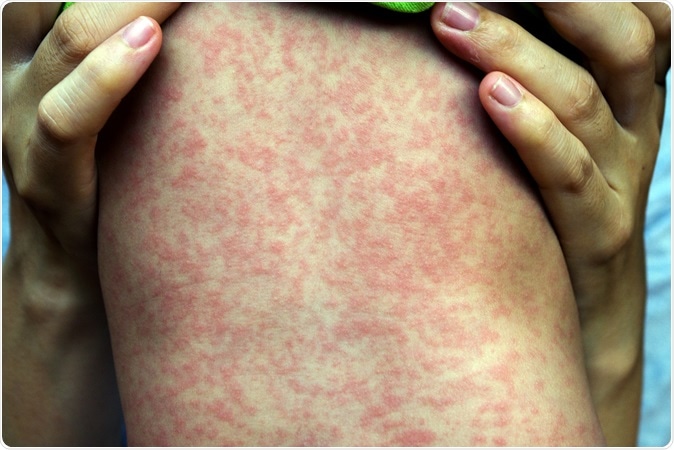According to the World Health Organization (WHO), there is a sharp rise in the number of measles cases across Europe in the first six months of this year. Measles has affected over 41,000 individuals and killed 37, says the WHO.
This week in a report from the agency’s Europe office, experts have said that these numbers are higher than the numbers for the whole year in the past decade. In 2017 for example the total number of cases was 23,927 and in 2016 the numbers were only 5,273. Dr. Zsuzsanna Jakab, WHO regional director for Europe, said in a statement, “We are seeing a dramatic increase in infections and extended outbreaks. We call on all countries to immediately implement broad, context-appropriate measures to stop further spread of this disease. Good health for all starts with immunization.”

Measles rash: Image Credit: Phichet Chaiyabin / Shutterstock
Measles is a viral illness characterized by fever, rashes, runny nose, red and watery eyes and often an impaired immune system. In most cases it resolves within 10 days. In some cases, however, it may become life threatening. Some of the life-threatening complications of measles include brain inflammation encephalitis, meningitis, liver inflammation hepatitis, pneumonias and febrile convulsions.
In the 1960’s the infection was virtually wiped out of the United States after an effective vaccine was administered to babies. The vaccine offers a combination of protection from measles, mumps and rubella. The infection is highly contagious and often spreads rapidly within the unvaccinated via droplets released on coughing and sneezing. Babies who are too young to be vaccinated are also vulnerable. There has been a recent spike in cases among travellers who are unvaccinated. The spike in cases began around two decades back when an erroneous research paper linked MMR vaccine to autism. This discredited the vaccine and many parents stopped immunizing their children. Unvaccinated populations contracted the infection and it spread rapidly giving rise to these cases.
According to the WHO report, half the cases in Europe (around 23000) have been seen in Ukraine. Nations like France, Greece, Georgia, Russia, Serbia and Italy have over 1000 cases of the infection as well. England has seen 807 cases in the first half of this year.
WHO has called for mass immunization campaigns, raising public awareness and also better surveillance to prevent spread of the infection. They have warned that unless curbed, measles could become endemic in Europe.
According to the Public Health England 9PHE), the cases in England are mostly due to unvaccinated people travelling to areas in mainland Europe where there are outbreaks of measles at present. Dr Mary Ramsay, head of immunisation at PHE explained that most of these cases are among adults and teenagers who have not been vaccinated as children. “Anyone who missed out on their MMR vaccine in the past or are unsure if they had two doses should contact their GP practice to catch up.
We would encourage people to ensure they are up to date with their MMR vaccine before travelling to countries with ongoing measles outbreaks, heading to large gatherings such as festivals, or before starting university,” she said. The NHS recommends that all children should receive the MMR vaccine around their first birthday and then again before they started school.
Dr Nedret Emiroglu, from the WHO said in a statement, “This partial setback demonstrates that every under-immunised person remains vulnerable no matter where they live, and every country must keep pushing to increase coverage and close immunity gaps.”